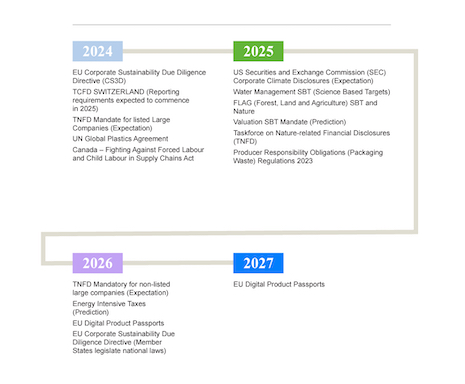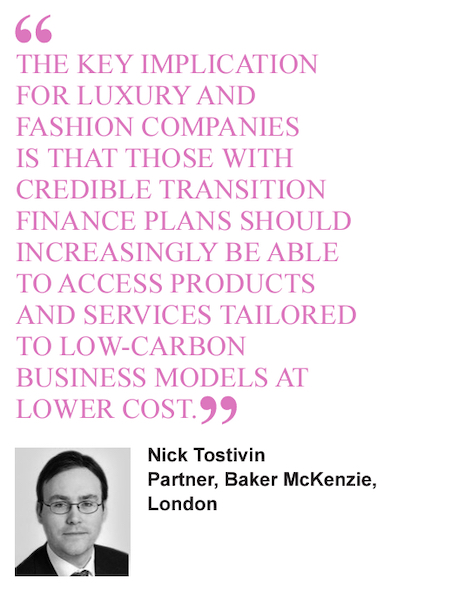Positive Luxury is detailing changes that the next four years will bring on the climate policy front.
Following an initial release in January 2023, the organization is providing the industry with an up-to-date view of impending regulations. The renewed ESG Policy Guide, constructed together with leading U.S. law firm Baker McKenzie, urges business leaders in the luxury space to prepare for the future of sustainability legislation.
Up next
Focused on upcoming statutes related to the environment, social, governance and greenwashing, Positive Luxury explains key shifts, slotting a few new rulings into its report.
Proposals and suggested revisions to existing laws join the list, starting in 2023, with most environmental mandates coming out of The European Union.
Revisions to the EU Textile Labeling Regulation, for example, would introduce requirements for the physical and digital labeling of textiles, sustainability and circularity parameters would need to be named as part of the update.
The EU Directive on Common Rules Promoting the Repair of Goods would empower consumers with the right to request the repair of applicable products, while The European Commission is preparing to present regulations regarding the reduction of microplastic pollution, outlining precautionary measures for operators handling plastic pellets, which experts clarify is the raw material used for producing all plastics.
Both of which are not yet passed, but have been added to this year’s plate, pending next steps.
 Positive Luxury’s latest ESG Policy Guide extends its purview through 2027. Image credit: Positive Luxury
Positive Luxury’s latest ESG Policy Guide extends its purview through 2027. Image credit: Positive Luxury
Responsible for the measures listed above, the EU Green Deal aims to achieve a carbon-neutral jurisdiction, targeting 2050 for an initiative announced in 2019 to come to fruition.
The strategy involves legislation that largely impacts luxury.
For instance, Positive Luxury shares the EU Green Deal’s Corporate Sustainability Due Diligence Directive, which addresses value chain-related due diligence requirements and the obligation that impacted companies adopt and possibly implement a climate neutrality plan.
Meanwhile, the nonprofit’s legislation roadmap makes clear that California’s governing bodies are driving much of the progress in the U.S. The state notably passed the Garment Worker Protection Act and the US Fashioning Accountability and Building Real Institutional Change (FABRIC) Act in 2022.
On the topic of governance, America’s next major milestone could arrive in 2025, with the introduction of the 2025 US Securities and Exchange Commission (SEC) Corporate Climate Disclosures.
The proposal would require teams to assess the material risks that accompany business operations and consolidated financial statements.
Regarding the third pillar studied under ESG frameworks, countries like Canada are challenging unjust social practices.
Raising the Fighting Against Forced Labour and Child Labour in Supply Chains Act, the onus is placed on corporations to prove leaders have acted to identify and put a stop to forced labor.
Passed May 3, 2023, companies will be required to mind the measure starting Jan. 1, 2024, and are expected to report on adherence by May 31, 2024.
How luxury parties can prepare
Looking ahead, Positive Luxury’s ESG Policy Guide extends its purview to 2027, mainly highlighting the EU’s Digital Product Passports.
The European Commission’s proposal involves maintaining a record of a product’s complete life cycle via technology that stores key traceability transcripts such as data on raw material extraction, production, recycling and more.
The officiating body has already specified eight priority industries, including textiles, for enforcement.
All in all, Positive Luxury leaves readers with a few recommendations for responsible conduct (see story), including ensuring that claims made can be evidenced in the event the claim is challenged and approaching the review of claims with diligence, taking care that status updates are specific, measurable and verifiable.
Experts also suggest implementing realistic targets and goals, and consulting with a third party to verify credentials.
Marketing departments should also remain on watch for greenwashing (see story), which the organization’s leaders define as messaging that is “deceptively or inaccurately presented and misrepresents that an organization’s products, processes and policies are more environmentally or ethically friendly than is actually the case.”
 The copublished report urges leaders in the luxury space to prepare for future sustainability legislation. Image credit: Positive Luxury
The copublished report urges leaders in the luxury space to prepare for future sustainability legislation. Image credit: Positive Luxury
Finally, luxury firms should make monitoring the regulatory landscape a daily occurrence.
In New York City, for instance, many await resolve from the Fashion Sustainability and Social Accountability Act, a state bill requiring fashion companies with more than $100 million in revenues doing business in New York to map their supply chains and address the human rights and environmental impacts of their operations, calling out carbon emissions, water footprint and worker wages, among other factors (see story).
The law would have an unprecedented impact in the U.S., acting as the nation’s first to focus on large fashion companies.
Positive Luxury says that sector players should keep an eye on this and other headlining legislation, as ESG reporting structures evolve and changes are certainly bound to continue.
“The ESG challenges and opportunities that consumer goods companies are confronted with span the entire value chain — from raw material sourcing, manufacturing, and working conditions, to transportation, sales, marketing, and product circularity,” said Kurt Haegeman, global chair of consumer good and retail industry group at Baker McKenzie, for the report.
“Whilst the ESG regulatory compliance requirements that lie ahead present significant challenges, consumer brands also have an unprecedented opportunity to shape a sustainable future,” Mr. Haegeman said. “We are thrilled to collaborate with Positive Luxury on this report and provide insight into some of the key policies and regulations impacting ESG.”
{"ct":"sCHBFpefXIPIWyn+iFK6vhuvBUjb\/mSzfpNJOz8fAkEQ1UuDPqL4ue2KorWN2\/gKomJrNsZ+bc\/XS0OqmpVtbqo06tY0l2\/fYu0pSZC7z6QXgvNt1dN0VMq17gQapvx9634ffoWzziZQLzvPiBElvNLE8zkdohL7zqJ2zVHQmaqWkysNloiLvNggO9H8GYJnbm8P3i2fc6C6d1xAplQnjFQmfQWL44gVYMY6XoMaFIPHofAud6v74wVQ7klnQqod0u3jm\/F3hbJ8nL3mxsq9FL34Uvyk5TTh3WhFckc\/A5SAviuhUpmR6yv65VZgpRj93DmfQ7t2ing0CbUWe9wLULdCGuMmjSlHFQ+1Zlt5F1XaAvTFbrGhKx5xQJwatwG09NIVJ6sG35Sc+NxTbF0wRoyaajcPo2fUZYD\/nwZ2Cp6PB3h+O2q\/o515vOjfnBeXhrOlwaSEUS0+B3H9z4RaI48pNhhNWyU+DmfBhu0lHVSv\/TV0usRO9flR98N6r3q2Lexl1O6olJPOa\/kd\/v3Cn0223WRibRcBYi7N241LZlOWJfEXhrZKJ6fX2eSyII3mMetRxrNd6gmSdipzhnYc08UjOtuC0fHZeyzxa4fGRhupGQOGqH66Ti8R2MQn0sHYVOkymRbChQKXEV+PnR4911j12MiS+IuyS6tZii3WrlfoQZkco1LwQYmF5TShWxNXGte\/E3rfC\/Q6Mo1KCVixeha\/m7tLiUrk0VfCSu6itQHWJxC0nFNh4QLR9+rVdidPqMCDS8KuKnlEnzxf7hATLQr9WNXQ5m+pq9hJWhTnung2TlO+oytIt4YZAiaUGRb4QilY1Nneg\/+FbFJFxiYBjZ1Q1\/XeB2q+wupzAc3ONNl38ALFzG\/csjvWBqkU6cDIPhk6qWXebrn4EMd4gRCyD\/AKlqWJQvxeZyVS\/Z4Al5FxvkKsfXdqCtUsol0qrE0W35kyLMfUPtKPETsWg5WFA5uDi7K1RboCTY7HbaYbuyztt8I6XHGJwuU8OdOlfL0WYWMXV\/z\/N4fTiE3Pi3ZbILb8U45LM+E6M9lK1ncaCcoGSTIn75BfZPK+EepEQR3LL8qEW\/PlHMJTJdhkwG3bAWW2FfEBoul5UfQxoKd5QXS9lrF+kcPRTVwCUK5qo7wQbj17mnJFBkKO7axHkYeWMN4tOQuthezS9JO3JueDywDPkvsKR3Jdch0SEWFG5gWaXIc4W8242dJTUA\/gFJSLRHIUiLl72mPKYIX1SAB4bIjEHiuGsiO39XlZfy4SQRXS1VJf6Q3QRWFo2m1Ea+HBglN+kwxLfITMt08uQ6\/9YGCXBvvj6xiWxPOIBBss5RM2jA0sEFFYGD1cJsuYB7fDjCKQ4HJNuxLYWqJ3SdGZUnj6ixDngVMRkbnfpkbzQG5Kk2khbBEzXC38w7yPzXy5ZyQh02575vWoi6A3eSCF9BBI\/3HkDcd5jcoHVZpNWlhZQDRbpv3VFF8cdwKVeNBzclQ\/gloYKGWCe0cuFRXecbXAnJbhnZGenxjz9vrLFaGiUHtBOfNFTSbXWTmOglmo4N4hQwytGJHLmf6AH7aW6YXg3UHvXjv7hL1pGcPBBMwFHS+IJAaHct6PAVVJd4dFQii5OAHgC7nY6iEn\/8cWfiXwBKfUKMvYzE0rv\/IyTG90q7WQYK4VI+VrY0Pbx6oY2Xg4gPl+geL3u+kMS329C+fsOv4LIAM6o4KtmEHrkvrwrUSscrvFtaY7UQVMxIji9FSpO8S55VkzIzyoWRJKtGEpUoghUda0baO1Yo+A9O3T1zYjEP+WaK0svjIOAgPESlrzMcPWcfDkP202NweHOthg88wYQcp0SK14IKd1+H\/vucnR1Lw45epSBTMOrFkLIHeuj5qgF2ayXjIMF9OgD2RPYgEXO1SpUW1iDyWbQ8Ol8aH7Icgg3D4vDoh5tp0WJ4elVN8qE0xdokjVMwptSWsP+peqAFeS7N\/bRzM13vMK0ZN5WbUlq0A4z6A0GBIvopFtqBPMSSXChi8ijMtr8aaN266HMOoMTZp\/AzzP0ET8Cy5d4nNKxqjtV58+KIo149gMQyoAnY+kq4wp6p91IAfndn13TSiqj56DKtDZVBbXmMOnx1K0\/9wdGJSckXRg79bXVqI8JWeCBaX5+AozeJ8HvUnklpEEiikjBwNxv+LMHdZlblz537yFh\/4uaWHfaMTS1TziM0yqp1Mfr5mAHX2Jlao8RVfcsBNuawougxWcsTvqmk7L+h3Lj6cCIjsGcaa2\/kcO2CARmkKyPu4weUqRG8Atno348I4mxVwrJy+8\/918B\/Fh9f+n7aQPK4vfKPkaWMZ5TfoL59ycnfHbjhsTmQDbZXhiJoYeeAKGnuQOFOd4kyjLlUNgzDwPHnmi3prCFUuCwL8ANeMvIfPh5bh2lGQPNgVRfHla4WuCae9\/EYHWhXxt8DewGdzGNBvgPChCipcWsfD4\/9PO7lQL\/Quh6\/9Kxq6g0i7JSdbSfp5hXPhpjpOaVN3XBJLXhqnV7LEuZn3lQAoXjFV7xq\/9irzjNmdPzq7MIM8hMJUbEEsQDyQ4FGp8CnCgknwu0Sj1j1L3taXpq\/UBJjW\/rtQiEGoIc3Fx1QVt0IsxSoApD8hmisgzZxMPW\/FpxCoBc5ZgSSjRyYCjgY4awNYbhdKc3gxXnwLcEOzN7w06k9FJHJSMpTBeuS7YNRDEDTntWskT86gK5KJBF8v6u5O1qwgvpjLyfhJA+iw+QuBX7RBYL7WLzvXnfnsQnw8l1kK3sHJOr1QxeR6RLohgoD02VeubEJ67LhyFA31X0jEAU1VoKDG4zUJ9UExFuX9+D6mC\/T4mRnLI0GiNwpFbNr8ttFJwbVGz+Rr8gU9tweuxNbTxuYRnZ0hQdodr2tlX\/FccLXm\/9viWRC5k7TCR\/d334tbvdLTEzgnvnqC\/d+I8G882jCMfDEKIWZs+RUpmlJuJ3vRdUiW9U7ECTVZ3pYL1Gh2uxJ2Es7wg+F351etvRKM3vUyXfi7fbGsar3oKN3xCRCFdZaoHWkOX25ttNjkfuT+znqR9AELltPXeS+2LACGiaMFAcYOHHjssUr8JR2GJkniga60FaqtO3OUtuAgoD4QlhVv3AkqS+EyN4ldmDD25fkTSoYT84fRedjConz9WiGF+OOnnQ9t0VDmtpSkfJRI7v\/Zs8aujQNXyd8XUl8gNPsRldNQh+pv4OC6xNYLsdeDD1a3PnugD2fBoXmCEyb35Y2p1Lk3xBdJColr75Mgaxr8C8jvbrxkUW0adXJY6hsuy3PeNvcY8IngT253DU6JLL9XskcZy2LNx5x+AqmE\/uORX+LLYqkIMCRnT6dBvL49jlRmD83f2aR5bzEQuV2tQvqA6ms1B4XgRStfRBCzaQTMGOW3vjhvY70PhvkfR5jGlm1vZgok+8CdAfyxiD\/V7JjtvJgj6GgMi8I+TyVb9Tvwz9lxJL7DUiKXaxBZCAIpbaYNBmG0ekCpQVagRroQGP5TE+ZpequnHrKDUSt2hHaoar2Wt7e3DrDmR5oUI\/u7xHCmKDCZbac7+cv+cHSd4t\/r+n0pt9tTh0nItmSNRIzSPLO+K0TGNl9IRNTYG69Nk00fdILmCyHhw08REapzxJgM0SexUP4Lhj+UWvrUBI7sMbFJf7T7zW1D2hbXYZULrnjeQtR5Je1LfqcDBuID23yKM5GHOGNiPS9yTIQtGhUS3Fzxqe0X+14LuSP+yKihjyNJCIWHJfwZ0nzhR1i4Uf5XK156hrgx0S18KzaW8h2v4CTFBkUuBimk1ZubnryTgNEw6jAKKW8uRt2gdfVbe8QBbw8lWOPH0j4b6urUkUUDLLcLKk6wooZK7KJ5wxJBel8nUnEywXqiPdv5doMeXNKtzb\/Pu9UIRDVtCfdWSAv3N6mqYSOs3OHPqdJ6j1rkTxfBYCHmQM\/xDJgvv5UZQ8wicajGhY\/ZLZpPiJFJn2x0PZW1HDA\/The2N\/WnVziBP3yt4UwaVrkdyUPNvozShnJGllJzuPWnUvjr1486hkiDif+PF8PC2ICLo8mmzZ+sH1pgqY+\/HRPucAUXNF9inHYuAhikHnbmn58OoVvsOL3K8D80fvv7lizPbPU41LRgiDDyMXUZBd6skky\/rhcb5XapjQo1UeQIKzvRFlyqNf4kFxvIDWUAlU6zltSSZwDQ9Ds3QZM7lbSJ8dhkxRkW4yQtvjDdARrfKIYOtFj6pMaTHrbm2BOMSRVql6rIKQKFYXm\/YmtTK2MHLPWjrQqdgx8Azf\/cw1XIyL6r56d64UGR95gwKQOF35v7EEQDMBxzDkLLn9Rb9lh3pJSM9Kj0Hb5uO0ya5W3bcZHKAuBrAVoOxbPXBsEjWVo5GkHQQKYGyM0H17xmoq7PrwTOb\/haShZwBCcqGKOpUKkn2eLyi8oiF+r3krnme9dGqssDD26NL4dFSnjIUzuwZLUNfSvZR2BOrvZC0U+dh2GCfmPme4NlLQcNFNarEt2hhPSNM5Pl556xjzbKDXF91Kmb0sSi\/odA3\/CWgzWwRaVx9\/77fCjOzd\/lWFlPkZdEqOy81HbYr9oCI9xLcCLbLoKdW2eFSzV1LEaD4LxIzLYFzycb2EEKKxrEhBYybxOVMl9HsLeRQWhBey4a1i50br9Bj1PNYqrvtJR3yMMidOpqUMDbQns13sT6Bcl7eb8JLOXO4wJMZGdpVNy8QSKmIW3ev5iRX9jKsHuDIYTftp5\/QhCUeVu+33zW3w+000Wd8QwpFA+KXgc3vF4imIcr6VtDcf+x64itvtBXvq4HMhNo56U0tgBXhDPHhmDn7vQUN6AEn\/tFOIcODLuoKsSBhV\/TZnRYTH\/Z0ZNjEWcMlsi8egq60S+u2\/yOLZKV5UNvuPdq4mJDvseyQ8AlTksfCAHrNZBOQQ8UdmR6tAMLXvULNlqPGaXXqe8m29ke\/m33y2SLicb8\/4fC\/1uDLGvS7rjFcVmehzUCgo2pHO92eauV4aIswtfj\/EcZHAgoT9rPGa2MtDZpxkmOGRBkSzzi9Ra376KHdBDRILwtWQVKm9g7A13ZZVXSYEFtTEMfUPiwTAs4z0nmQn6Z423fBUO7dnqSFSA0\/nahvoiYUcnE1iTBGPA8keHaXCqzeGlUCrgBcRYfM2o5I1Kdd8TCSR3\/rEdVE\/BH4I86BlL0m1sDcVPEvc\/nflQNyZ\/jqvTrY5Kt7EcJmLh1R\/KqYQY4FYemfvR8so1ALFDD+nCSgPzAfe\/Visn+fAm6iIiflonnywmTAywMxwEIZ2CmnHUdDdwhHH5XC5ZaeekXnozHzk3fIE\/3+mz2h7BhA9fh2inHD4IiudG2uKhIT8mNmmac3FJZnomuAd6ujkucnxOrn+\/DUYMulGAXCgaBf7onUi9A0uUOKVEm8gIdCQuNZO31\/qn0UlHnYTGC7Z7ipYJfdz8S7OPxFf7mP4iwVgC+6FGaHS72ohawbCfGZJEyCVFarTLf8Hr8+8wHW8kJIbzxsSClsAo\/b8MSjAT+5XiaQlTqJLaEClnwpsWCvGHDwvec\/v72TtUIIwca82kudVso3gmVTMrg4C5NSxlJNW7vNTtcw3Agukc6P3xiZrvsAKL5KJRKSviI5TLjRJIvRmawYmaVOnqfJelALAfzeEHpoYkEYxei9ljUo1kmTWJXaJadVkbZdXReomZj9VSGsvoP5vGgV2wT\/kexwITy9tbWP1I1JUEF0asrXX\/D0bsn3nkfiq\/MvIxauxQlG9tEzO3y\/h\/gI53zc7s7KeEwfjEZI5ZswT62chkjkeVaqSYzDlCo5rF5LGZvxSiy4BrlBKdjdSN591xldy7113hWAsZxozVPyCEXYh7wRs5Pa0Bfj9bWWoYQlY9qMoWSXpPMfQZ\/yd+xBJNw5+vRhGFO3mqJWqeYkCySccilmIYiZRNLz61NvdYKHOh1ZUFttMk4gi4qfQQldKKU9K1oVeO05odLBFKq6MPqcbwZqUWThGgd9MCyofbZR\/wJ5hLrVkqfRqYfnExXtO3x6rUv+ZAaTaiiqP43UOFQNT5SETRZy3Dn77g2bj+3MFZip\/GxAMpDhsF2cTjhD01sdAzWjV+\/16DlIIGPTByCC\/z2bRez\/TxkoigCfGAIHQQpe1kHQu73H1fbZADExTpArS2yH+UKuDWie3O4LFhxPRhGPenRJdlpy1IGrPOMAJStsD3uKQUy\/yzrTEedp5NDwooW0By8mxODvYU26jHYSgwsNJgLwKD2mnpyOdiC2KSQu1V1mgQLEusosbbJuKUgOnzuq8FhhnGM4BQrEY83tAle9vMsUJRbSRsO26NSMYncxE9VBpjR2ai1OIt1H3sShWkCJURBJ4mfR3vc649z76aunf64iTXUj588zUPmuaegQlreSh16+\/xarvV0rUwp8ozLGL3xBQMLfuXYK4Orin09CixBpJ1YVTpII\/y7b7HYbz42ZOCppaj\/Sh25Ij1MILYmVipQoNCsvMBfF+SPpM8LL5QLp\/qHHUPMRGqcunbc\/LYRscb+VZdzteR7Pkd+sdG\/WnvUJO5R5QKNngPHuW2NfG59VEBxReUTqrsQR6bgsLcFdB5j4G35J5u2bLCd8NpEe8WNNVa6WK4t8S3Q1wOsSmVd1JWFWdy+F0Qk8oMFzq6ypGxVjXqAjGYQgTIwZBR4QMKPOTi2SktcCq6LOXn73QQa2UckkSOTQlpvpPgYXH+dVuI1Ld8f0meX\/DvCH2XZ9m1PkMdkdLnXPtSOZjo6zmEz34Q1UESbYe\/S+wcu\/jNpqMXfqKE3XRoj1cE5rQpMqt0RsnqiKu4EKJsmHKVLGJW0pnrRELhGRpr5yx5TEiU6xZxPkkx5KYTh5pAAec+CO7RV\/IW9vEH+sbvngjYFsa8E5Kw6w1qpG6xL74ZzmYS3PqqUSIFXBu\/3JfG++gnr1DmzCTTickxO5JRuDhbXejaL5n\/9+nznn5EuuRYKCDPzfHrGbtme3VXgyM\/J94tDyVHaKdJsf6EK7qrN8PH4q33yRg9n+cu+ikAw3D0am4v1FmGdX0RuWFAFN8yWY7iBkEFUDsp64M2xWedkcddFi7TvNbHIbvmboup2Si3RHaghxw0L0EagRwv57ujZiC7tcXQ6BwB0EJjcBANaTeQsANg7U8cipvYYKEeD0JDWd84ypr0xkAfc2ie8g4LYjypyZhQnwgKMjXNZ8zbyp8SoT0rupDAzwLQTVY9nfVOySZq3YMEgdW0UyjtkpsdH7QD7uTLNz\/n52qGCUkS8XXWgsL\/UBbnTGf5rwQWhxD0PZYpf1HvaNNvptgpbKwCBeod77hEo7mfIucJk76m+gcrF17arLg2\/67+XcZ5VkvOxohoh9zpWmK3cuz7QnK0EYB+DbuZXQnt8wqRKUbpM2SIA1caO9QzIYQlKYDlTwifDjx18SXsmrH+QEjgQJFUHj9m8ag\/IFb\/PjSMWmskELllt5Oa0Jfu+Ho5bw1UOXf+JBABX+y4aOzPJRys8ZqCPmAjiw\/lKBwWMuYVuwi5mkOVkbeM8v1tooknf87L2MuuOVWGieGkfemenRHY+zEniaRTrq8oXXerPRBNYFt72rDoaRCXacOyHHwlkCPnIYZb7QebL0jq1g27lYHDFP43P2lcDzg9soddZH0myxyEHQSrnktBEr5iVf7Q2TZHiOSSOtR6uJvC6rH2vd4wrkAoRLTO0E1KFUso7RvnnI7G4JAmERErFnPf3WNwRwgWpY7IKVvqQPhH\/QrU\/9be7m22uWDz1MhCS1rS7lABx8DqdR8yCgaV86DX8WbgobzuD6xBjqz6qkZpgrQp8s8xrY3ZDCoZ9rHEIzv3GAnYJaEVMIl4qvAE7IAPh7jtR8hHWWKca2looE5oxzF12twKDBzplcuMYOrwFlNQGPuz6LqZI9nSS2StVW8Ig2Y6+H2V8Pcq+45Ta8ZzYKpLwU4\/XDVlWANKxcfG0L+CUnhry6i4Jt14wZsuknNHaA4O1iA1vYMExSos5pRA9xuAPfl6jbXwGQgkF1pqLx5p9L8EhNPa0cTEQKbH0XnKDuwhiqfRJj0by\/izestpu6Ya2iBSmgMqWKcaCutes9IZJFsjW\/Nf5iUT2EIEDKfMAQnMeaQcCdIyq7ZlLbN2BkH16W92imsbueKzHrl2ocGlk\/kbot9f8AIHbTOM2GAiuwAGKnHpeUTQbx6OMQVBVhLO3SCdveS57+UNUFQXSTHmIdYP+78RAaUjtdUT6XfMMMu+IA2NI9W5oerpH8GGWTfeYPCOBS8u8JhkMMlaQb\/+K0b3SjNglJA2+wPfkVPFxrn5hpgQtszYKa704Hz2NEmV5LZiaB3hV\/qEG3FHsQ5tE\/uUa4SJa3SqNK4lPa4Ll+JmfOBEyJTVlQd7iw25QYC8doJeL9\/b28DUGwSTWRPHvH94b3G4cT5sE5\/laNNp08g+rFmTYg9Y\/pumfpEOm4ZzvSJU+D4IOae8vL1qU9I+Uw4VYCWMarwiTrYGfHJ2QjZfWO+2hH3DM6joU+YkeHV+fTItPa4zL9ubkOfI6zTHga7bRkUM9ZbfnyDfCuE2yQHQNtbv\/ctKo1KuSmUV\/I65lnrA6fWPPw\/E5Zjtdhl2K1yERACcYQ0rdN67NuJ+MU\/vmpPk1Vp5dyp2l2Glv2cSDzFmND\/xPbsMhkNAqtc2CWgTH4tjzlFfpHvVreTYfTYvjR0kIYh3sJNXBYcYccYtrzsYEgF+NVW7lj8jb1fek6yS7Qg2D+tThLYs97esBKy78tN5atRngykzSwKrcHTrsRHoeceGAhwpggbMQv8XMg8yNTsqaFwzDB1AJyKYwgjw12cfrhmZ9qKUDdmIOyx5CDPmiGAuAS5xomjhMM4WR+7D4Kd28Zjv0YJUGbyjCEK3ECnYDSPoVNwuzCEVyK6OG+qXxhINAiZmtxqRnsoojQNEZevY9SeOeVhk6Xp6jUiVre0oFlbyXS9aesbv83OjxiSRd09SXZ+XbkncMKbH9WMHs4YN1bP0WdKYzMqILh6vcxjRzmwJFc2KtOH\/lWEJzEDMTMV9KVTNvden0Hlx85SDudTTay\/C5SVlVFddtOtJ0xrzzgldmFYFWxsiJCGhAST1mMKqThOKL8juuapiuryMXRSoiN7hnopD9UonjtluOWFb3P+BkTB4u0CmxWMSl36SLTUZue4\/p4K2qS6dS3ro1GcLTiOlliwo4\/g7sBMocoaeYm3orcdokChsIyuAKsGxJZFfYVtddYxWjkPz\/Azysqo+MbENTiyno4MMmAwcAcLcMkNF2yVKXmSnJ9fKGBLXuGRXez4ioDg0xDpnSGnEtkCk0tSnLovj9\/WO5b5CkLPPSEcDNqmhKSIIGJoEPEugEovM\/flWz8JwpM5999UtaurrXvg1qDL9bkySqPdkeA7cjXoZ7URC2CHutDXKfhYWCH\/403A98SrR3VY2Vb4\/\/wgTB8sQ\/VD7QnJBEfBH0DivdiiDfw5qcEq2OqcDlGFuyo6pVVvw\/RjgwPZkmdZzaNMgF84fEAiAEzuB7ALVJFtb9o2LskOc8V5ikeWjRuaF+KriFSwL1K76yymYucGX13fbvHzY9r91vQXW+vUa7VtPk7zYIBS7BT2MX0hkt57+gg7QGHpCFR78qi6eB7lzTEJQh6UlLoUbqSoPUGKKPa6e+JEoQYwCJW9j4hhrhAKsV\/AeEedTCw1kqP+bQ0q+z7hG9A95HRvcBGLj3lbU4u0thVbwr4Vc\/11ZWyPXTp17yljvqXD0rBQSHsIuZzW7Qrhz0OOvKpihmveq\/9rMFbcppUe5l5PiCjT+tKVtTiPmgHOBxAq5ubAqD2LkRV3KTysapatgKVZFivmKIghCbBm1YgZm1zHCDqikwX7QRjGx5n487HD88u+f3yoNq6CqJkQQXjCIvo+XUa9NEh\/J9N+nM72sAkSGnIcz6x8lqkyV4m3SjXBcpEogjST7W2srVFRR\/xeVJ4dosN\/mlpe25bbI0xO1s4D6oAzZM3W5bVlyoTeWJg3nyd7aWjbzVxGwn2OwZV6qL+xIm1MSJryPUZT8Th7F2lZ3sOjhI8OoV8+UopS8HgkT6JZ+ZzvagShQMoBsIPrxQ4ITWEQfNDWKeWXIFwGlORLzweZo8dbr\/E8KQw6E8N6JW\/y+NE+52RWVEbxDDt\/kw8NRW1Mz90DsBp0jecXg7FluJst\/cL7Snqs1U2gWm\/R3DCx5ncscxmJhUvidFXVDAA2ZY5+TDQOncjQGXzdnkBQZ2PnORAAAteKzdUJ9byWKgqbw8Ee7JhaCw39NG6xpeOWw6OAyrayxAWWoA4rHatPzHPQOFYPQPa1EA7TN2zwOtrvtby+fHGKxcmkPelN9xPSSRk7GYJDhGKznMHkmhtjkF0hq46g9zCROD9IiRKl+fE3WUZivESB7jYq41Hewtbk5LI7E6aQl0XmB2BV4ZI8myReUJGgzldtmDOc\/lVSAHhyy7DvmtRLKea+o1ftD4232EemtF5KTOpz0YlGVLrj563aMeNU3wjcAA4KPmxFmaIb+EOJeeib\/zBpU5w5iVkQjOGRdMo2rMVDr5CR85wdZHIpLW+609Vw5mVsHm7E6H1FCVuJOejjFAZd+chne6dBckZQoBOEU92b3Kvu++x14bcjynghIB1Xz7mEWbVXUyjdT97n5wNioN2T19fIfg86mUmr1bh7YgmRC8srCW704TTtUw=","iv":"d577de23af11a3e90ee9022adb838b50","s":"56eed690ff64c084"}

 U.N. Sustainable Development Goals installation “Forest for Change” went live in the courtyard of London's Somerset House on June 1, 2021. Image credit: Burberry
U.N. Sustainable Development Goals installation “Forest for Change” went live in the courtyard of London's Somerset House on June 1, 2021. Image credit: Burberry  Positive Luxury’s latest ESG Policy Guide extends its purview through 2027. Image credit: Positive Luxury
Positive Luxury’s latest ESG Policy Guide extends its purview through 2027. Image credit: Positive Luxury The copublished report urges leaders in the luxury space to prepare for future sustainability legislation. Image credit: Positive Luxury
The copublished report urges leaders in the luxury space to prepare for future sustainability legislation. Image credit: Positive Luxury